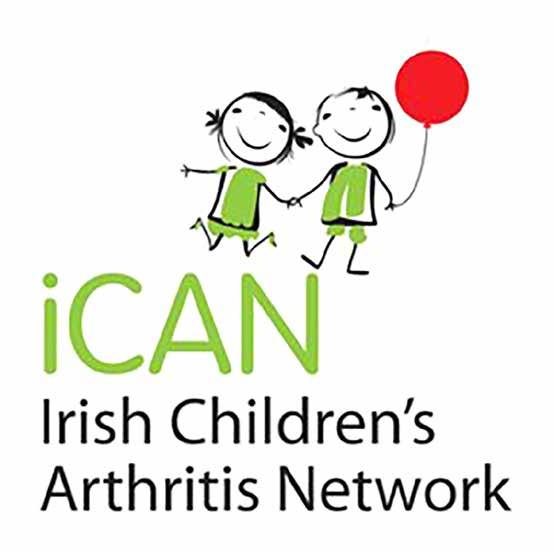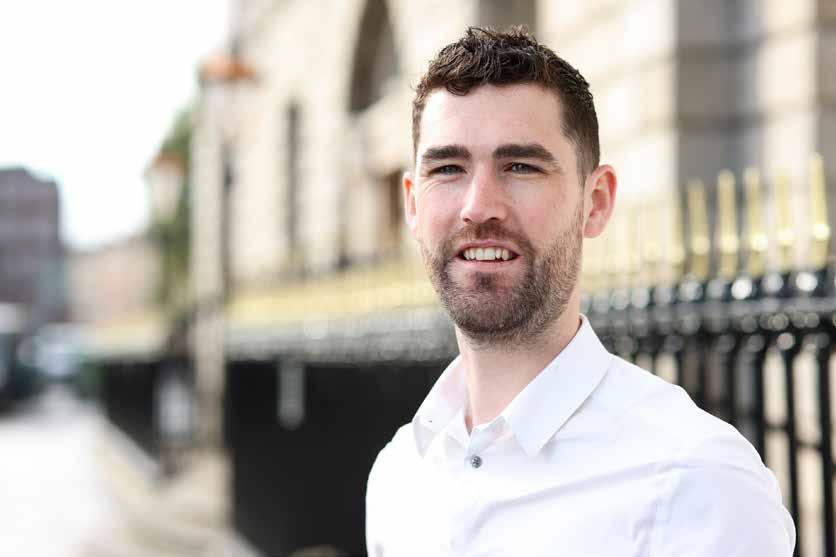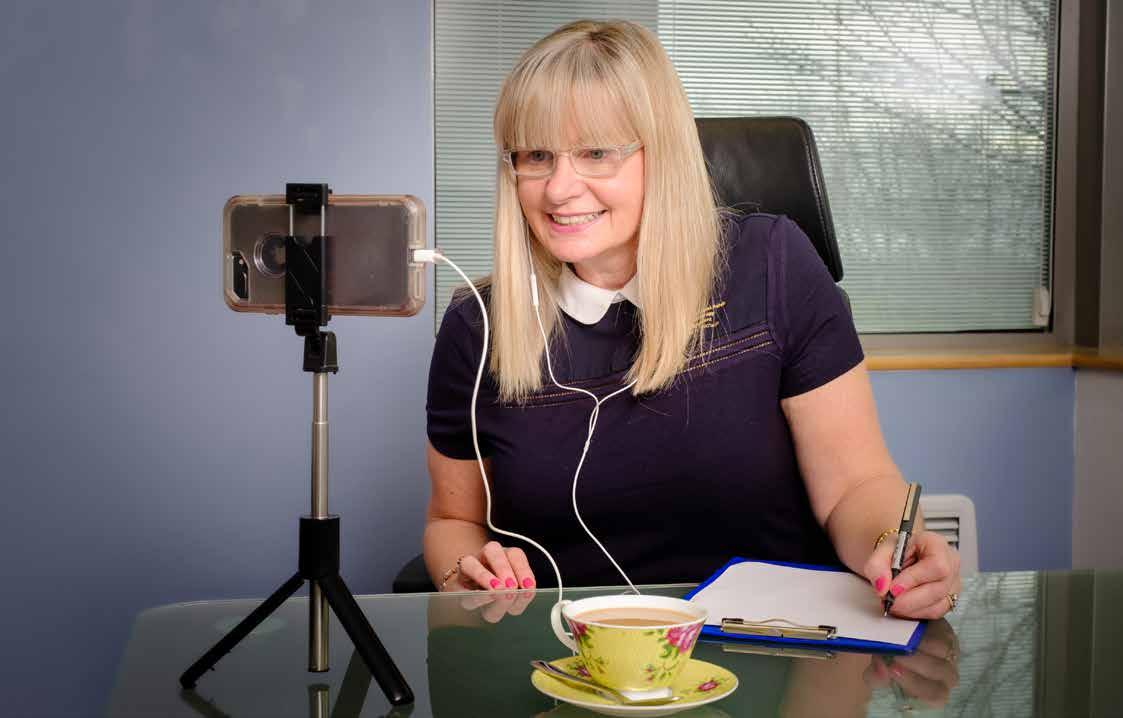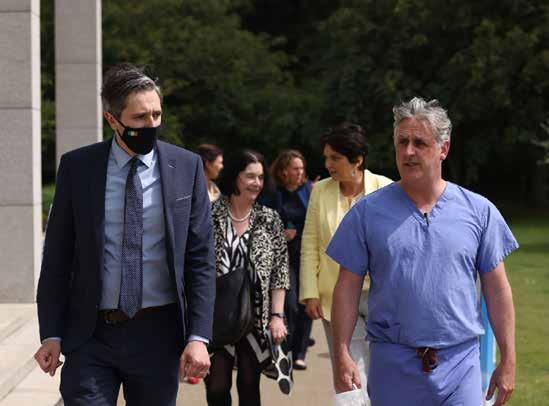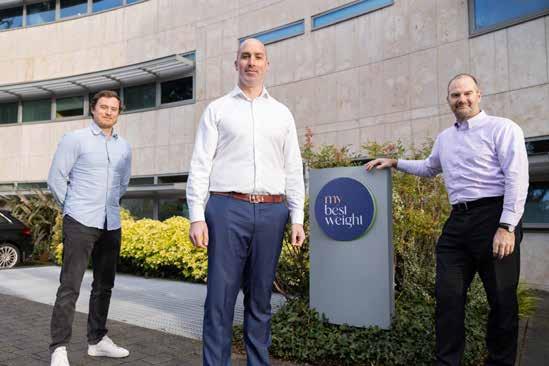14 News
Researcher of the Year Awards UCD Chair of Critical Care Medicine Professor Alistair Nichol with Minister for Further and Higher Education, Research, Innovation and Science
The Irish Research Council has announced its 2021 Researcher of the Year awards. UCD Chair of Critical Care Medicine, Professor Alistair Nichol received a special commendation for his ‘exceptional contribution’ in the field of medical research, specifically in critical care clinical trials and especially in the global fight against the COVID-19 pandemic. On receiving the accolade, Professor Nichol said, “I am honoured that the IRC has recognised my work and that of my team over the last decade and particularly during the COVID pandemic, with their special
commendation today. This represents many years’ work by a large team in Ireland and beyond. I am very grateful to my colleagues within UCD, the Irish Critical Care Community and our global network collaborators. “Ireland’s Intensive Care Units continue to be the front line in our ongoing war against COVID. Our research collaborations have allowed us to understand the COVID waves during the pandemic – allowing us clinicians to identify patients at the highest risk of death, and the genetic factors associated with death in the ICU, so we can identify novel therapies.” Professor Nichol is Director of the Irish Critical Care-Clinical Trials
Network (ICC-CTN), which runs, and builds capacity for running, clinical trials in Irish Intensive Care Units (ICUs). Funded by the Health Research Board, the ICC-CTN has also become a world-leading coordination centre for major global clinical trials, including REMAP-CAP. REMAP (Randomised, Embedded, Multifactorial, Adaptive Platform trial) is a global trial that determines and continuously updates the optimal set of treatments for communityacquired pneumonia. REMAPCAP has added trial domains so that the platform can respond rapidly to COVID-19, specifically (i) antiviral therapy and (ii) immune modulation therapy. To date, REMAP-CAP has identified three safe and effective treatments that reduce death and organ failure in critically ill COVID patients, namely steroids,
IL6 receptor antagonists and anticoagulation, in ward patients. It has also determined that Hydroxychloroquine, Keletra, Hydroxychloroquine and Keletra in combination, convalescent plasma, Anakinra and anticoagulation do not improve outcomes in critically ill patients with COVID-19. Professor of Zoology at Trinity College Dublin, Yvonne Buckley was named Researcher of the Year for work focused on the growth, reproduction and survival of plant and animal species. UCD’s Professor of Social Policy Michelle Norris was awarded the Impact Award for her proven record of research impact ‘beyond academia’ in the field of social housing policy. Postdoctoral researcher in the School of Psychology and Institute of Neuroscience at Trinity College Dublin, Dr Kathy Ruddy won the ‘Early Career Researcher of the Year’ award for her work using brain-computer interfaces to improve brain function. Postdoctoral researcher Dr Sara Delmedico, UCD School of Languages, Cultures and Linguistics, was awarded the IRC Maurice J Bric Medal of Excellence. Postdoctoral researcher Dr Marco Timpanella, UCD School of Mathematics and Statistics, was awarded the IRC Thomas Mitchell Medal of Excellence.
Osteoporosis: Keeping Safe at Home Written by Louise Brent, Irish Hip Fracture Database (IHFD) and Major Trauma Audit (MTA) Manager for NOCA
Each year many injuries are sustained in the home due to falls, a lot of which could potentially be prevented. Data from the Irish Hip Fracture Database (IHFD) and the Major Trauma Audit (MTA) two
FEBRUARY 2022 • HPN | HOSPITALPROFESSIONALNEWS.IE
national clinical audits governed by the National Office of Clinical Audit (NOCA) show year on year that the leading cause of people sustaining a hip fracture and major trauma injuries (which result in life threatening or life changing injuries) are falls typically from standing height or less and most occur in the home. Over the course of both audits much has been done to raise awareness about home safety for the prevention of falls, however due to the unprecedented impact of the COVID-19 pandemic this has never been more important. Over the last two years we have all had to endure prolonged periods at home none more so effected than our older population. Indeed
it was right to tell our older people to cocoon to protect themselves from the pandemic in the early stage but little has been done to support older people regain their confidence to go back outside and resume normal activities. This increased time at home will undoubtedly lead to a higher risk of falls at home owing to the increase in frailty associated with restricting ones mobility. In addition the social isolation, fear of going outside, decreased bone density, sarcopenia are all valid concerns as this pandemic refusing to abate. In the most recent Irish Hip Fracture Database Report advice was included about how people can remain active at home while being safe at home too.


